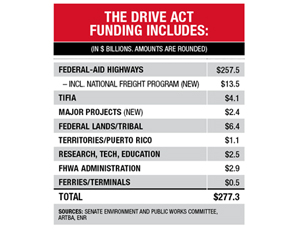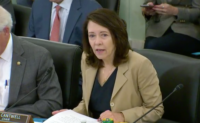With another surface-transportation extension likely this month, construction officials continue to push for a longer-lasting measure to end the dribs-and-drabs funding they have endured for several years. They welcome the six-year, $277-billion highway bill that the Senate Environment and Public Works Committee cleared unanimously on June 24. But they are acutely aware that the Highway Trust Fund is about $90 billion short of the money to fund the bill fully. Where to find the dollars remains a mystery.
As they look at the panel's Developing a Reliable and Innovative Vision for the Economy Act (DRIVE), construction officials like the six-year span and appreciate its 3% average annual increase over current funding.
They also point to DRIVE's $13.5-billion national freight program for projects on key goods-hauling routes and to its major-projects provision, authorized at $2.4 billion over six years. Like the Dept. of Transportation's popular TIGER grants program, major projects' aid would help finance important road and bridge improvements. But Congress, not DOT, would select the final winners.
DRIVE lacks a key ingredient. "What's missing, of course, is the funding," says Jay Hansen, National Asphalt Pavement Association executive vice president. "Therein lies the Gordian knot."
Construction groups support a package of revenue options to augment the trust fund and hit, or exceed, DRIVE's numbers. EPW Chairman James Inhofe (R-Okla.) pegs the gap at $90 billion. To the industry, boosting the federal gas tax is a central part of the answer, but Republican leaders oppose that move. Speaking at a June 17 hearing on the trust fund, House Ways and Means Committee Chairman Paul Ryan (R-Wis.) said flatly, "We are not going to raise the gas tax."
In the Senate, revenue raising is up to the Finance Committee, not EPW. Pam Whitted, National Stone, Sand & Gravel Association senior vice president, says that, in its authorization levels, DRIVE "puts out a target for the Senate Finance Committee [that] this is what we need."
Congress must extend highway and transit programs by July 31, when the latest stopgap lapses. Most observers think that solving the long-range highway revenue conundrum by then "is essentially impossible," another industry source says.
Current betting is that Congress will pass a new extension to Dec. 31. The Congressional Budget Office estimates it will take $11 billion in new revenue just to keep the trust fund in the black until then. Whitted also wants that stopgap to include "a hook" to require Congress to produce a long-term bill.




Post a comment to this article
Report Abusive Comment